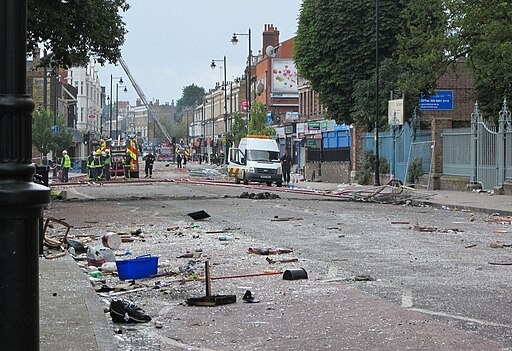By Bryan Fanning and Denis Dillon
The Tottenham riots in the London Borough of Haringey took place in August 2011. We examined three responses to them: reports by North London Citizens, an alliance of 40 mostly faith community institutions including schools, the Tottenham Community Panel established by Haringey Council, and the Riots, Communities and Victims Panel established by Parliament.
The riots coincided with the end of an era of British urban policy when various community-centred regeneration programmes introduced by the previous New Labour Government, were being wound down. One of its flagship initiatives was the New Deal for Communities (NDC), a ten year programme which invested £50 million in each of thirty deprived areas including Tottenham. More recently, David Cameron has promoted the idea of the Big Society with an accompanying rhetoric that blames big government for enfeebling the civic sphere.
 Two of the three analyses of the Tottenham riots that we examined shared this perspective. North London Citizens emphasised the need to create new community leaders; the Riots Communities and Victims Panel emphasised an on-going failure of services to engage with communities and vaguely endorses an agenda of neighbourhood-level community empowerment. Cameron’s Big Society agenda envisioned communities and neighbourhoods becoming empowered to take local decisions and solve local problems taking over the running of services and facilities where appropriate. None of the three reports make such recommendations for Tottenham. Rather, they restate in minor key the need for greater responsiveness to communities with no clear ideas about how this might be achieved.
Two of the three analyses of the Tottenham riots that we examined shared this perspective. North London Citizens emphasised the need to create new community leaders; the Riots Communities and Victims Panel emphasised an on-going failure of services to engage with communities and vaguely endorses an agenda of neighbourhood-level community empowerment. Cameron’s Big Society agenda envisioned communities and neighbourhoods becoming empowered to take local decisions and solve local problems taking over the running of services and facilities where appropriate. None of the three reports make such recommendations for Tottenham. Rather, they restate in minor key the need for greater responsiveness to communities with no clear ideas about how this might be achieved.
All three reports emphasised a deficit in community cohesion. All three identified inadequate engagement by local service providers with residents as part of the problem. But Tottenham has been here before. The aftermath of the 1985 riot saw considerable effort to improve, foster and build community cohesion in Tottenham. Many of the buildings that were looted and burned in 2011 had been the focus of regeneration efforts.
We had just completed research on the efficacy of such policies when the riots occurred. Our 2011 book Lessons for the Big Society: planning, regeneration and the politics of community participation (Ashgate, 2011) examined a long history of failed efforts by the local authority to secure such participation. There were many reasons for this. Labour held a political monopoly in Tottenham. Community activism not sponsored by the party was often ignored. The institutional culture of the local authority councillors and officials was often hostile to community participation in decision-making even if official rhetoric claimed otherwise. Well-to-do parts of the borough had articulate well-organised groups capable of putting pressure on officials and councillors. Community groups in Tottenham lacked the skills and cultural capital that worked to win responsiveness from institutional actors.
The kind of community capacity that regeneration programmes in Tottenham sought to introduce appeared feeble compared to the on-going capacity for unsolicited activism found in well-to-do areas – expressed through single issue campaigns, the establishment of long-standing amenity groups and well-organised networks able to compel responsiveness from Council officials and councillors. The New Labour diagnosis was that areas like Tottenham lacked the necessary social capital. But the regeneration programmes it put in place engendered only a limited form of community capacity, and this depended on the life-support of funding that has since ended.
What then for Cameron’s Big Society? Even after decades of community-focused urban renewal in Tottenham, both community-institutional relationships and community cohesion remain weak. However, this does not justify the withdrawal of state support or bucolic expectations that civil society can fill the resulting void with minimal support. The very localities that need community empowerment also need state support the most.
We argue that what might work for Tottenham is an approach that seriously interrogates why past regeneration efforts were unable to empower local communities but at the same time accepts that such empowerment cannot be realised without significant state funding. It would take seriously the scepticism-bordering-on-hostility of the Big Society to local authority officialdom. But what Tottenham needs for the foreseeable future is big government willing to learn from past mistakes.
Professor Bryan Fanning is the Head of the School of Applied Social Science at University College Dublin. Dr Denis Dillon is employed by Community Services Volunteers (CSV) in North London. They are the co-authors of Lessons for the Big Society: planning, regeneration and the politics of community participation (Ashgate, 2011). Their article, The Tottenham riots: the Big Society and the recurring neglect of community participation, appears in Community Development Journal.
Since 1966 the leading international journal in its field, Community Development Journal covers a wide range of topics, reviewing significant developments and providing a forum for cutting-edge debates about theory and practice. It adopts a broad definition of community development to include policy, planning and action as they impact on the life of communities. It publishes critically focused articles which challenge received wisdom, report and discuss innovative practices, and relate issues of community development to questions of social justice, diversity and environmental sustainability.
Subscribe to the OUPblog via email or RSS.
Subscribe to only current affairs articles on the OUPblog via email or RSS.
Image credit: After the Riot – View from near Scotland Green. Photo by Alan Stanton, 2011. Creative Commons Licence. (via Wikimedia Commons)



Recent Comments
There are currently no comments.